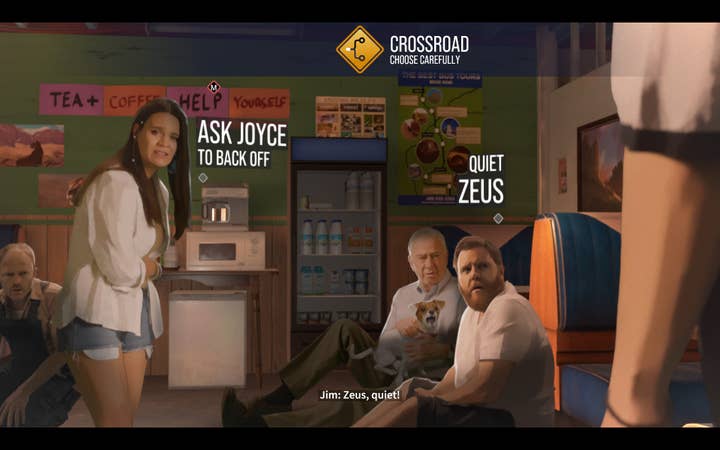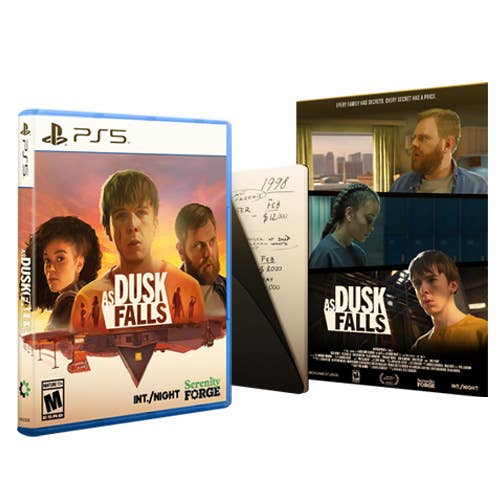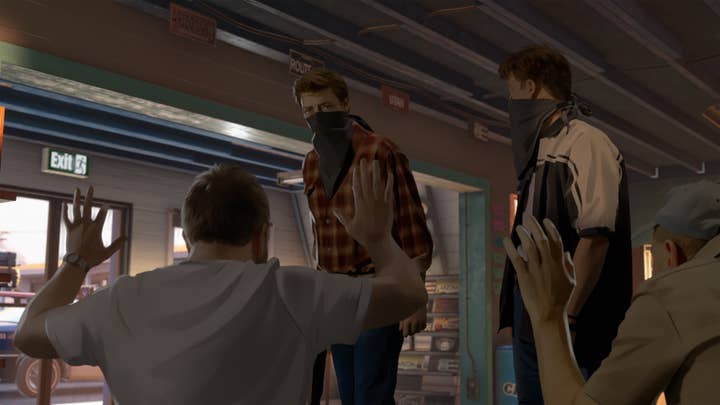Why games consoles are holding back interactive storytelling
Interior Night CEO Caroline Marchal discusses how narrative games might thrive if they move away from traditional games platforms
Agency is perhaps the most important distinction between video games and any other form of entertainment. You have no control over how the characters fare in any book, TV or film, but in games, the power is almost entirely in the hands of players.
While this often translates to how well said characters do in combat or when confronted by puzzles, developers are exploring more ways in which players can shape stories as well. One such studio is As Dusk Falls developer Interior Night. Ahead of her Develop:Brighton keynote, we catch up with CEO Caroline Marchal about the untapped potential for interactive narratives.
To begin with, she observes that there are lessons game developers can learn from the likes of TV and film when crafting their stories. As Dusk Falls, for example, uses many of the same tools from those mediums, which makes it easier for players to get into; after all, everyone is already accustomed to cinematic storytelling.
"We're using the same currency, telling you a story on the screen, but then we are adding this agency and interactivity, which is even more powerful and just draws you into the world and with the characters."
Interior Night demonstrated this in 2022 with its debut title As Dusk Falls, an interactive crime drama that follows members of two families across a period of 30 years. Marchal says the team remain "super proud" of the game, which achieved positive reviews from critics, as well as users on Steam and, as of March this year, PlayStation.
In fact, a physical edition of the PlayStation game lands on shelves tomorrow, where every copy not only includes the game on a disc but also a poster and a recreation of the in-game sheriff's black book, which help players uncover more secrets within the story. "We had a lot of fun crafting that," Marchal adds.
For the Interior Night CEO, As Dusk Falls demonstrates what she believes is the full potential found within the interactive narrative video games can offer: the ability to share and shape stories together. She tells us that countless players have told the studio about how they worked through As Dusk Falls with partners, family members or friends, each voting on actions with their phone or controller. Marchal even played through with her 73-year-old mother.

But crucially, she emphasises that games like As Dusk Falls are just one flavour of interactive narrative.
"The genre is much broader than that," she explains. "When you look at games like Unpacking, Norco, Venba, or Papers, Please, [those] are very different takes on the interactive narrative, all valid, and I think it's great, they're where they need to be. Maybe they are not on the right platforms yet for everybody to access this, because when you know you're on Xbox, you're accessing quite a core subsection of players. If Venba was on Netflix, for example, it would be able to reach a much wider audience, and that would be fantastic."
She adds: "As soon as you need to buy a console to enjoy Venba, you're not reaching the full potential audience."
If dedicated games platforms are the barrier to interactive narratives reaching the vast audience they deserve, that suggests that mobile is the way forward for this genre. After all, smartphones and tablets are ubiquitous by this point – but Marchal observes that the nature of the mobile games market raises different barriers, and these ones hinder developers.
"Mobile is very tricky because it's based on free-to-play, and having a narrative interactive free-to-play is difficult," she says. "There have been examples like Choices, and so on. But it's very difficult, because premium is not a thing on mobile anymore, sadly. It goes kind of against those experiences – imagine playing Unpacking and you've got to pay to [continue]. That's terrible. It breaks the narrative flow, it breaks the experience, it's just not great for that.
"But of course, everybody has [a smartphone] so how do we crack this? It's getting really difficult, because now user acquisition is insanely expensive, and it's an entirely different business. When you are used to 'crafting games' for PC and console, you are like an artist.
You are doing your thing and then sell it as premium. Switching to the mobile model is very difficult, it doesn't always suit the design and the skills."

"As soon as you need to buy a console to enjoy Venba, you're not reaching the full potential audience"
Instead, Marchal suggests that smart TVs may be the way forward. While these devices do have gaming capabilities – there's a marketplace for Android titles on smart TVs – little is known about how many players actually engage with these. Streaming could be another alternative, with Marchal particularly keen to see what Netflix manages as it works on its own streaming offering.
"If that works, it could be a great opportunity for those kinds of experiences to reach the TV audience – which is massive. It's essentially everybody, gamers and non-gamers alike."
But Marchal observes that Netflix's particular offering will be a "slow burn," as its games streaming offering is still in its beta phase, and only a small number of the service's subscribers engage with the titles available.
The Interior Night boss speculates about potential new models that might help bring interactive narratives to a wider audience. Could a platform offer game rentals, or perhaps offer an ad-based experience, with 30-second spots at the beginning and end of chapters in a title like As Dusk Falls? It's unclear what models might emerge, but that may be remedied by the growing understanding between the games industry and companies in other forms of entertainment.
"It's a different culture between Hollywood and the games world," Marchal says, by way of example. "Sometimes it's hard to talk to each other, but we are seeing more and more virtuous collaborations, so I think they are learning. Hollywood is learning to understand the appeal of games, while games with their increased focus on meaning and story and good characters, good character design, are also learning to speak to Hollywood.
"We and many other developers are already literate in story language, but there's still this culture. Culture-wise, it is very different to how they do business. So I think it will come.
Netflix and Amazon are already well-positioned. Apple's got the money, if they wanted. Then it's about the vision of their execs, I guess. Because it's about how serious they are with that – they've got the money, that's for sure."

Platform and business models won't be the only barrier to overcome for future narrative games to reach a mainstream audience; the key, Marchal says, is to make these titles as approachable as possible – something Interior Night has some success with in As Dusk Falls.
For starters, removing 3D navigation is a major step towards appealing to non-gamers. While many folks may enjoy the story of something like Life is Strange, for example, having to guide an avatar around a 3D space can be something of a barrier. Marchal observes that even core gamers once had to get accustomed to moving a character with the left analogue stick while controlling the camera with the right.
"Remember how long it took you to get used to that? We got rid of that immediately, and when you do that, the trade off is you've got control over pacing, which means you've got control over how involved people get and the tension and everything. You can take them on a journey much more easily than when there is 3D navigation.
"Even if we say As Dusk Falls is easy to play, we just use the left stick and the A button, you have to know what the A button is. Whereas with a phone, everybody has one. There is no friction here. Everybody knows how to swipe, how to move, you've got nothing to explain."
"How many memories do you have of great moments in games versus great moments in TV? You grow with them, they change your life"
Marchal adds that multiplayer is instrumental in making these games approachable, but emphasises that it's important every player is involved throughout.
"When I worked at Quantic Dream, we had tons of reports from Heavy Rain that were 'Oh, my girlfriend sat with me.' Great, but I'd rather she plays with you. It's not the same thing, like watching a football match from the benches. Levelling the playing field meant everybody plays all the time."
Marchal adds that once the audience doesn't necessarily consider such titles as video games, it opens up the door for more people to participate and feel competent, without having to understand the typical gamer language – elements such as UI, health systems, inventories, and so on.

"It's about characters, what they are doing in the world and everybody is very competent at understanding people and motivations," she explains. "And we crafted quite a complex story with secrets. Nobody is either a good guy or a bad guy, everybody has got layered intentions and reasons for doing what they're doing – just like in life, really – so every player is very competent at understanding.
"That's part of being broad. It's not just about the controls or the accessibility. It's also about what the game is about. It's about people struggling with real life problems, and then suddenly anybody can jump in and participate on a level playing field."
The final barrier is that, even with minimum friction, interactive narratives are just that: active. They are a less passive experience than watching TV or films; 'lean in' rather than 'lean back,' as Marchal puts it. That means stories like As Dusk Falls are unlikely to ever replace prestige television as people's go-to choice of entertainment, but Interior Night is determined to continue offering them as an option.
"Maybe it's not something you do every evening, but when you know you've got a chapter and you know it's roughly the duration of a TV series episode, or there's like checkpoints in the middle, if you say 'Well, let's do one chapter tonight,' you know that you're going to be in just for an hour.
"It's not something that you might want to do every evening, but at the same time, I don't want to spend all my life watching average TV shows and sometimes great ones. When I have a choice between playing Baldur's Gate 3 or watching a show, I play BG3, you know?"
She concludes: "Video games are so awesome. I want everybody to be able to enjoy that. It's just such a compelling experience. For me, reading a book or watching a great show, that's really good. But then playing a really good game with someone you love, it's like the top of the chain. How many memories do you have of great moments in games versus great moments in TV? You grow with them, they change your life."

